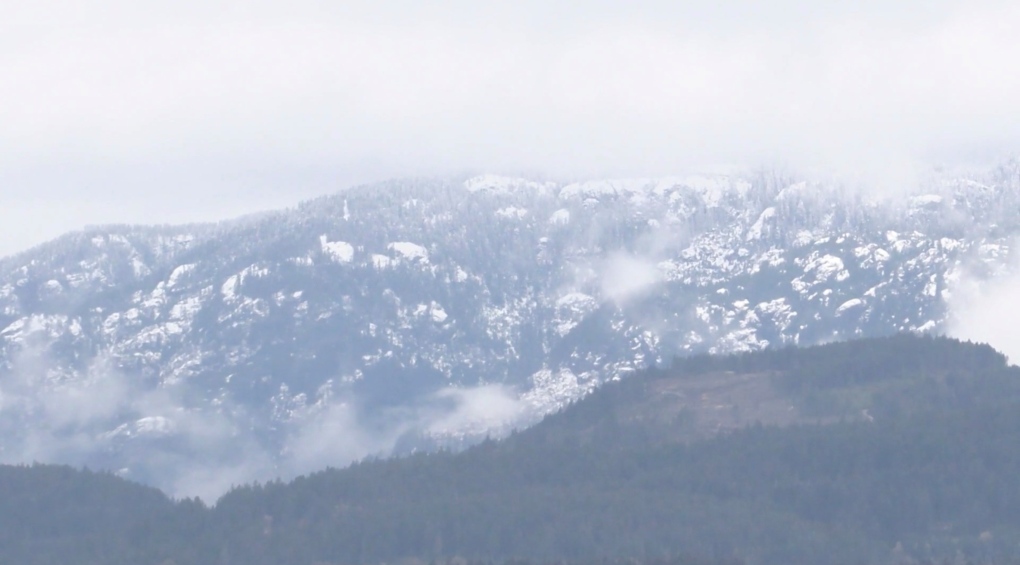'I'm going to be in big trouble': Vancouver Island snowpack remains high, increasing flood risk
A cooler-than-average spring has delayed the snowmelt on the mountaintops behind Russell Farm Market in North Cowichan, B.C. That is a potential threat to the business.
“I’m going to be in big trouble,” says France Bournazel, owner of Russell Farm Market.
The owner of the market has experienced more than $500,000 in damages caused by two separate floods over the past two years.
”Now they’re talking about another flood,” says Bournazel.
Reports from the B.C. River Forecast Centre show that the provincial average snowpack sits at 113 per cent of normal. Vancouver Island sits at 108 per cent.
“It was surprisingly wet and cold here on the island,” says Jonathan Boyd, a hydrologist with the B.C. River Forecast Centre.
Rain at sea level often means snow on the mountains when the conditions are right.
“If we had some type of heat dome, like a heatwave in late May or early June where we get temperatures 12, 13, 14 degrees above normal for four or five days, that’s probably the greatest risk,” says Boyd.
The risk is major flooding in areas like North Cowichan.
“If another flood was to happen again, the positive thing is we’re more prepared,” says Bournazel.
After two remediations, the walls around the interior of the market are now covered with easy-to-clean metal sheeting. Electrical plugs have been moved a metre up the walls and coolers have been outfitted with flood breakers.
It's still not a scenario the business owner wants to experience again. She says another major flood could mean the end of her business.
 Snow remains in the hills around the Cowichan Valley on Vancouver Island. (CTV News)
Snow remains in the hills around the Cowichan Valley on Vancouver Island. (CTV News)
“Unfortunately, this region is prone to flooding,” says April Diver, emergency program coordinator with the Cowichan Valley Regional District (CVRD).
Diver says that with our climate changing, the potential for more flooding is imminent and people need to be prepared.
“Know where you’re going to go and know where you’re going to meet up with your family if you can’t go back home,” says Diver.
She went on to say to have a emergency preparedness kit ready and to sign up for a warning alert system.
“It’s the best way to know that there is something coming and that they have to take action,” she says.
CTVNews.ca Top Stories

Richard Perry, record producer behind 'You're So Vain' and other hits, dies at 82
Richard Perry, a hitmaking record producer with a flair for both standards and contemporary sounds whose many successes included Carly Simon’s 'You’re So Vain,' Rod Stewart’s 'The Great American Songbook' series and a Ringo Starr album featuring all four Beatles, died Tuesday. He was 82.
Hong Kong police issue arrest warrants and bounties for six activists including two Canadians
Hong Kong police on Tuesday announced a fresh round of arrest warrants for six activists based overseas, with bounties set at $1 million Hong Kong dollars for information leading to their arrests.
Read Trudeau's Christmas message
Prime Minister Justin Trudeau issued his Christmas message on Tuesday. Here is his message in full.
Stunning photos show lava erupting from Hawaii's Kilauea volcano
One of the world's most active volcanoes spewed lava into the air for a second straight day on Tuesday.
Indigenous family faced discrimination in North Bay, Ont., when they were kicked off transit bus
Ontario's Human Rights Tribunal has awarded members of an Indigenous family in North Bay $15,000 each after it ruled they were victims of discrimination.
What is flagpoling? A new ban on the practice is starting to take effect
Immigration measures announced as part of Canada's border response to president-elect Donald Trump's 25 per cent tariff threat are starting to be implemented, beginning with a ban on what's known as 'flagpoling.'
Dismiss Trump taunts, expert says after 'churlish' social media posts about Canada
U.S. president-elect Donald Trump and those in his corner continue to send out strong messages about Canada.
Heavy travel day starts with brief grounding of all American Airlines flights
American Airlines briefly grounded flights nationwide Tuesday because of a technical problem just as the Christmas travel season kicked into overdrive and winter weather threatened more potential problems for those planning to fly or drive.
King Charles III is set to focus on healthcare workers in his traditional Christmas message
King Charles III is expected to use his annual Christmas message to highlight health workers, at the end of a year in which both he and the Princess of Wales were diagnosed with cancer.
































